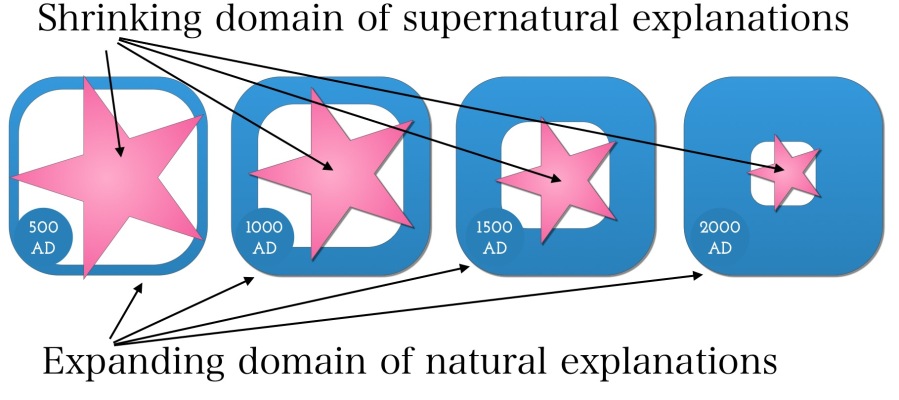 Imagine your friend Tom claims to have personal access to an infallible source of knowledge. He also claims this personal source of knowledge wants him to be in error about the world. Yet, Tom is time and time again wrong about his various assertions about the world. He does eventually correct himself, but when you ask him why he was wrong in the first place, he simply shrugs, and suggests he has again consulted his infallible source of truth, and has it all figured out correctly this time.
Imagine your friend Tom claims to have personal access to an infallible source of knowledge. He also claims this personal source of knowledge wants him to be in error about the world. Yet, Tom is time and time again wrong about his various assertions about the world. He does eventually correct himself, but when you ask him why he was wrong in the first place, he simply shrugs, and suggests he has again consulted his infallible source of truth, and has it all figured out correctly this time.
Would you believe Tom? Are not the constant excuses of Tom identical to the modus operandi of someone less than honest? Is this similar to the history of Christianity?
We don’t have to assume the Bible is a scientific textbook (even though a divinely inspired book with knowledge that could alleviate or reduce the suffering of billions of innocent children does seem quite consistent with an actual loving God). We can merely assume that the bulk of those who consider the Bible and it’s alleged God to be the source of truth would not make erroneous proclamations about the physical world. These errors could have been prevented by 1) a clear Bible passage, 2) direct divine revelation from a God who presumably would not want Christians to be in error about scientific knowledge, or 3) the alleged relationship Christians have with the Holy Spirit. The following is a list of erroneous beliefs held by a significant percentage of Christians at various points in human history:
- Diseases discriminately target those God wishes to punish or test.
- Diseased individuals are being punished for their wickedness or are being tested.
- Physical calamities discriminately target those at which God is angry.
- The Earth is the centerpiece of creation.
- The Earth is flat.
- Seizures are caused by demonic activity.
- Evil-doers can be weeded out through painful “trials by ordeal” in which the accused are horrifically tortured, often to the point of death, to assess their guilt or innocence.
Most Christians today do not hold these beliefs. Not all Christians held these belief in the past. However, the question that must be ask is the following:
How could so many allegedly bible-reading and spirit-filled Christians not have been immediately shown the error of such beliefs by the Christian God before any damage was done?
Christian protests against such notions and related practices are centuries late, and are offered only after disconfirming scientific evidence has gained acceptance. Does this sound like a world in which an actual God of Truth is presiding? Can the Biblical God be called a God of Truth given the dismal track record of factual errors promoted by those to whom truth was presumably available?
It might be suggested that there has always existed a lineage of true Christians who have always held faithful to the truth of these matters. If this notion could be demonstrated, this would be a wonderful demonstration that the God of the Bible is indeed a God of Truth. However, evidence for a small lineage of Christians speaking out against the falsehoods previously listed has yet to be offered.
ADDITIONAL NOTES:
It might also be pointed out that the erroneous scientific claims of Christians has followed the same basic trajectory as the erroneous scientific claims of many other religions. More and more of the implausible stories from their holy books are relegated to mere allegory, and the scientific mistakes of their spiritual predecessors are shrugged off with the promise they now indeed have the truth.
It might be conceded that God does not care whether Christians have truthful beliefs about reality. That version of God would avoid the criticism of this chapter, but that evidence-staved version of God would also appear much more identical to a non-existent God.
There is a principle of active science that is based on this poor track record of supernatural claims. “Methodological naturalism” is the notion that, while we don’t completely dismiss the possibility of supernatural influences in our universe, we proceed in scientific inquiries without any expectation we will encounter a supernatural cause. This expectation of a natural cause is warranted by the long history of failed supernatural claims. When we encounter something unexpected and unexplained in our universe, instead of asking which God might have been the cause, we look for a material cause since material causation has been discovered to be the actual cause behind a multitude of initially puzzling phenomena. More and more of our world has been explained by material causes, while supernatural explanations have retreated to nearly what one would expect if there were no God. Could this have been different? Most definitely. If an actual God, either through divinely inspired scriptures or through direct revelation, had given substantive and actionable fundamental facts about our universe a couple thousand years ago, that would have given future supernatural claims much more credibility. At bare minimum, it would seem that any actual God could have prevented erroneous supernatural claims that would have tarnished his credibility. Given the track records of natural claims and supernatural claims, which has currently earned substantial credibility? Which seems to have been fundamentally flawed in its assumptions as demonstrated in its long history of erroneous claims?


